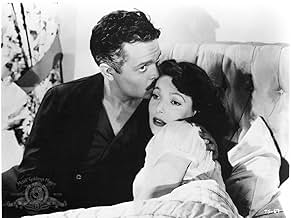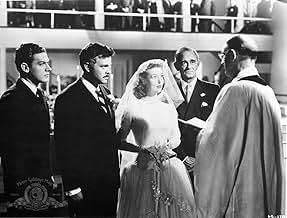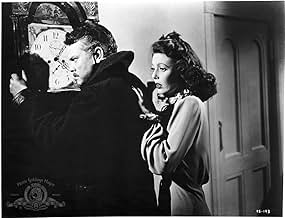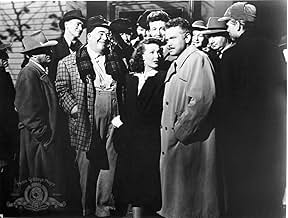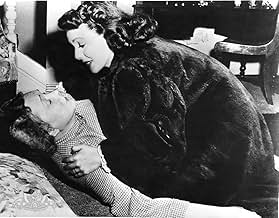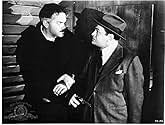CALIFICACIÓN DE IMDb
7.3/10
30 k
TU CALIFICACIÓN
Un investigador de la Comisión de Crímenes de Guerra viaja a Connecticut para buscar a un infame nazi.Un investigador de la Comisión de Crímenes de Guerra viaja a Connecticut para buscar a un infame nazi.Un investigador de la Comisión de Crímenes de Guerra viaja a Connecticut para buscar a un infame nazi.
- Dirección
- Guionistas
- Elenco
- Nominado a 1 premio Óscar
- 2 nominaciones en total
David Bond
- Student
- (sin créditos)
John Brown
- Passport Photographer
- (sin créditos)
Nancy Evans
- Undetermined Role
- (sin créditos)
Adolph Faylauer
- War Crimes Commision Member
- (sin créditos)
Fred Godoy
- Undetermined Role
- (sin créditos)
Theodore Gottlieb
- Fairbright
- (sin créditos)
Joseph Granby
- Undetermined Role
- (sin créditos)
Ethan Laidlaw
- Todd
- (sin créditos)
Opiniones destacadas
This film has been knocked by many people saying that Orson Welles was forced to work within the strict confines of the Hollywood system. I have absolutely no problem with this. Welles is a master craftsman. He made great films, period. In an interview he said that the studio cut out " a couple of reels" that take place in South America at the beginning of the story that he felt was the best part of the movie. As a viewer I feel that the film is compact and taut. Adding more to it would not help(in my opinion). On the contrary, I think adding more might make the film sluggish. As it stands the film remains dark. You feel that evil is present. You are just not sure what is going to happen next.
The performances in this film are for the most part excellent. Edward G. Robinson is amazing. This could have been a cardboard thin good-guy part. Instead he turns the character of Wilson into a smart, cunning hero. He is self-assured not obsessed. He understands what most people in the town don't: Kindler is a monster who is capable of anything. To catch such a man you have to be several steps ahead of him. Also excellent is Konstantin Shayne as Meinike. You can see the fear and madness in his eyes as he repeats "I am travelling for my health, I am travelling for my health..." before going through customs. Make no mistake, this man is "an obscenity that must be destroyed" to quote Wilson. Just look at his scene with the photographer in South America. He is used to people following his orders. Welles is also very good as Kindler/Rankin. There are moments that you actually feel sympathy for him. His obsession with fixing the town clock is very significant. Here is a man who needs things to be precise and structured. He wants total control of his environment(a good example is how he treats his wife). Welles hints at this man's mania but keeps him human. Even though you want him to be caught, you can't help wondering if he'll get away. Loretta Young is unfortunately just average in this film. She has some good moments (especially in the final scene when she confronts Rankin/Kindler)but her hysterics are just too much. The scene where Wilson is showing her the Nazi atrocities is well played. She keeps a certain composure that works well.
Overall, a very well made thriller with top notch performances and solid direction by one of cinema's masters. I give it 8 clock towers out of 10.
The performances in this film are for the most part excellent. Edward G. Robinson is amazing. This could have been a cardboard thin good-guy part. Instead he turns the character of Wilson into a smart, cunning hero. He is self-assured not obsessed. He understands what most people in the town don't: Kindler is a monster who is capable of anything. To catch such a man you have to be several steps ahead of him. Also excellent is Konstantin Shayne as Meinike. You can see the fear and madness in his eyes as he repeats "I am travelling for my health, I am travelling for my health..." before going through customs. Make no mistake, this man is "an obscenity that must be destroyed" to quote Wilson. Just look at his scene with the photographer in South America. He is used to people following his orders. Welles is also very good as Kindler/Rankin. There are moments that you actually feel sympathy for him. His obsession with fixing the town clock is very significant. Here is a man who needs things to be precise and structured. He wants total control of his environment(a good example is how he treats his wife). Welles hints at this man's mania but keeps him human. Even though you want him to be caught, you can't help wondering if he'll get away. Loretta Young is unfortunately just average in this film. She has some good moments (especially in the final scene when she confronts Rankin/Kindler)but her hysterics are just too much. The scene where Wilson is showing her the Nazi atrocities is well played. She keeps a certain composure that works well.
Overall, a very well made thriller with top notch performances and solid direction by one of cinema's masters. I give it 8 clock towers out of 10.
I picked up this movie, mostly because of the cover and the price ($4). I was happily surprised as to the quality of the movie.
The story takes place after the end of World War II. Edward G. Robinson plays a government official named Mr. Wilson. He is in charge of the Allied War Crime commission. He is looking for an elusive war criminal. His name is Franz Kindler (Orson Welles). He is suppose to be the one who came up with the Nazi plan of mass annihilation. There is no evidence, nor any photographs of Kindler. To find Franz, Wilson releases Kindler's assistant (Konrad). Konrad inadvertently leads Wilson to Harper, Connecticut. Kindler is hiding out at an all boys school as a professor named Charles Rankin. Konrad arrives on Charles' wedding day. He is getting married to the daughter of a liberal Supreme Court justice.
This movie is definitely film noir, in the lighting and the grittiness of the events. It is also quite evident that this movie was directed by Welles himself. If you have seen any one of his movies, you can see how he functions. The story is enjoyable, if not slightly predictable (especially if you have seen other film noir films or have listened to any golden age radio programs). Overall, it is nice to see Edward G. Robinson playing the good guy for a change. I also thought Billy House had a standout performance as Mr. Potter (the owner of the local general store). He provides most of the comedy relief. I highly recommend this movie for fans of Edward G. Robinson, Welles or the film noir genre.
-Celluloid Rehab
The story takes place after the end of World War II. Edward G. Robinson plays a government official named Mr. Wilson. He is in charge of the Allied War Crime commission. He is looking for an elusive war criminal. His name is Franz Kindler (Orson Welles). He is suppose to be the one who came up with the Nazi plan of mass annihilation. There is no evidence, nor any photographs of Kindler. To find Franz, Wilson releases Kindler's assistant (Konrad). Konrad inadvertently leads Wilson to Harper, Connecticut. Kindler is hiding out at an all boys school as a professor named Charles Rankin. Konrad arrives on Charles' wedding day. He is getting married to the daughter of a liberal Supreme Court justice.
This movie is definitely film noir, in the lighting and the grittiness of the events. It is also quite evident that this movie was directed by Welles himself. If you have seen any one of his movies, you can see how he functions. The story is enjoyable, if not slightly predictable (especially if you have seen other film noir films or have listened to any golden age radio programs). Overall, it is nice to see Edward G. Robinson playing the good guy for a change. I also thought Billy House had a standout performance as Mr. Potter (the owner of the local general store). He provides most of the comedy relief. I highly recommend this movie for fans of Edward G. Robinson, Welles or the film noir genre.
-Celluloid Rehab
The IMDb trivia page says this is Orson Welles's least favorite and least personal film. Aside from "Citizen Kane" and "The Magnificent Ambersons," I think this potent film noir is his most enjoyable—certainly more so than the ugly "Lady from Shanghai" or the overbaked and convoluted "Touch of Evil."
Charles Rankin (Orson Welles) is a professor in a respectable Connecticut town about to marry the daughter of a U.S. Supreme Court justice. But his name is fake and his past is filthy. An earnest convert to Christianity (Konstantin Shayne), who once ran a Nazi concentration camp, is capable of exposing him. "Rankin" kills this little old man and buries his body in the forest. But he isn't safe because an investigator (Edward G. Robinson) from the War Crimes Commission is on his tail. Rankin needs his own wife (Loretta Young) to help him elude capture. But his fascination with the local clock tower may prove his undoing.
As a director, Welles strains a bit too hard for effect in this film—and much too hard in everything but "Kane" and "Ambersons." In those two films all of his technical effects, striking as they are, seem effortless and exactly the right choices. Here, he has imperfect moments—such as the scene where his character is frantically, and inexplicably, trying to pick up pieces of paper—but everything else is splendid, especially the climax.
As an actor he's always compelling, but I think he makes one bad choice here. He's too guilty-looking in the early scenes. It makes us wonder why no one suspects him; and it robs us of a dramatic contrast when he begins to realize he's in imminent danger.
Loretta Young is generally a dull actress. She doesn't have enough skill to make an impression in the early scenes; but once the part requires histrionics she performs her duties well enough. Certainly her character is morally dubious and therefore fascinating in itself.
The best performance by far is Edward G. Robinson's. One of the great actors of his time, this ugly man has enough talent and star quality to underplay his role to great effect.
Orson Welles fans might find this exciting, well-plotted thriller too un-Wellesian to suit them. Otherwise, this is highly recommended.
Charles Rankin (Orson Welles) is a professor in a respectable Connecticut town about to marry the daughter of a U.S. Supreme Court justice. But his name is fake and his past is filthy. An earnest convert to Christianity (Konstantin Shayne), who once ran a Nazi concentration camp, is capable of exposing him. "Rankin" kills this little old man and buries his body in the forest. But he isn't safe because an investigator (Edward G. Robinson) from the War Crimes Commission is on his tail. Rankin needs his own wife (Loretta Young) to help him elude capture. But his fascination with the local clock tower may prove his undoing.
As a director, Welles strains a bit too hard for effect in this film—and much too hard in everything but "Kane" and "Ambersons." In those two films all of his technical effects, striking as they are, seem effortless and exactly the right choices. Here, he has imperfect moments—such as the scene where his character is frantically, and inexplicably, trying to pick up pieces of paper—but everything else is splendid, especially the climax.
As an actor he's always compelling, but I think he makes one bad choice here. He's too guilty-looking in the early scenes. It makes us wonder why no one suspects him; and it robs us of a dramatic contrast when he begins to realize he's in imminent danger.
Loretta Young is generally a dull actress. She doesn't have enough skill to make an impression in the early scenes; but once the part requires histrionics she performs her duties well enough. Certainly her character is morally dubious and therefore fascinating in itself.
The best performance by far is Edward G. Robinson's. One of the great actors of his time, this ugly man has enough talent and star quality to underplay his role to great effect.
Orson Welles fans might find this exciting, well-plotted thriller too un-Wellesian to suit them. Otherwise, this is highly recommended.
The Stranger was directed by Orson Welles but he did not adapt it to the screen. Although this is seen as a detraction from the whole by some who have seen it, I believe that Welles' deft directing and penetrating acting is what makes this a Welles film for my taste. He was never a facile actor - but he uses his usual wooden countenance here to the advantage of this role.
Another thing that fascinates me is the underrated status of this engrossing thriller. The action and suspense builds and builds to a peak of excitement that few movies can reach without lots of special effects and Foley work these days. This movie fascinates at every turn without ever seeming as if we are watching art. But art it was in Welles' direction and gentle handling of the unravelling.
Edward G. Robinson is the subtle but welcome prize we receive from this outing. The undercurrents of the horrors that have just come before this movie was made and its actions can be seen seething within his duty to find hidden Nazis. He is methodical and intelligent, it so difficult to see the difference between Robinson the man and Robinson the actor here. He is such a talent that we often mistake his ease for something else but acting -- and of acting he was a master. Plainly seen here as a gift to all of us.
What I like about this and many other good films is how facts are revealed slowly, layer by layer.
Loretta Young was good as the innocent young girl who believes that marriage is a sacred institution, that life has a course to follow which will not be derailed and finds it hard to accept the truth of the horrors behind her marriage.
It was mildly amusing to see a very young Richard Long as the open-minded young man with whom Robinson's character confides certain facts.
I recommend it to fans of psychological thrillers, mysteries and of course, of Mr. Orson Welles. So sad that the studio heads were such disingenuous towards this utter genius of a man who deserved more earnest accolades in his life.
THE STRANGER is not glittering masterpiece but it's a hell of great story that I do not tire of watching...and seeing each piece of the puzzle fall into place.
What MORE could an intelligent person want from a movie?
Another thing that fascinates me is the underrated status of this engrossing thriller. The action and suspense builds and builds to a peak of excitement that few movies can reach without lots of special effects and Foley work these days. This movie fascinates at every turn without ever seeming as if we are watching art. But art it was in Welles' direction and gentle handling of the unravelling.
Edward G. Robinson is the subtle but welcome prize we receive from this outing. The undercurrents of the horrors that have just come before this movie was made and its actions can be seen seething within his duty to find hidden Nazis. He is methodical and intelligent, it so difficult to see the difference between Robinson the man and Robinson the actor here. He is such a talent that we often mistake his ease for something else but acting -- and of acting he was a master. Plainly seen here as a gift to all of us.
What I like about this and many other good films is how facts are revealed slowly, layer by layer.
Loretta Young was good as the innocent young girl who believes that marriage is a sacred institution, that life has a course to follow which will not be derailed and finds it hard to accept the truth of the horrors behind her marriage.
It was mildly amusing to see a very young Richard Long as the open-minded young man with whom Robinson's character confides certain facts.
I recommend it to fans of psychological thrillers, mysteries and of course, of Mr. Orson Welles. So sad that the studio heads were such disingenuous towards this utter genius of a man who deserved more earnest accolades in his life.
THE STRANGER is not glittering masterpiece but it's a hell of great story that I do not tire of watching...and seeing each piece of the puzzle fall into place.
What MORE could an intelligent person want from a movie?
Who says that fear of terrorism is a new development, post 9/11. Imagine the fears and exposed nerve endings of the average towns person living in the shadow of World War II. There was the fear of infiltration by the Nazis with their secret agents, blending in with our everyday citizens. Orson Welles plays just such a guy. He is kind, pleasant, quiet, and very dangerous. He even sets about marrying a woman as part of his secret plot. Edward G. Robinson, who normally would have been the heavy, plays a tired, hard working investigator who is leaving no stone unturned. The plot is intricate, though predictable, and the whole thing is hard to take your eyes off. Welles was a great director, but perhaps an even better actor. He keeps this thing going, raising it above the common fair of the time. The writing keeps the good guys at bay, but the clues continue to sit there, ripe for discovery. The clock tower is a great symbol, continuing to remind us of the urgency of everything. The dramatic irony presented makes us continually uncomfortable. We are treated to the movements and activities of the villain, and being let in, it makes everything more enjoyable. See this if you can.
¿Sabías que…?
- TriviaThis was the first mainstream American movie to feature footage of Nazi concentration camps following World War II.
- ErroresTwo palm trees are visible in the first scene depicting the fictional Connecticut town.
- Citas
Mr. Wilson: Well, who but a Nazi would deny that Karl Marx was a German because he was a Jew?
- Versiones alternativasAlso available in a computer-colorized version.
- ConexionesEdited into Ninja the Mission Force: Citizen Ninja (2012)
Selecciones populares
Inicia sesión para calificar y agrega a la lista de videos para obtener recomendaciones personalizadas
- How long is The Stranger?Con tecnología de Alexa
- Does anyone know the answer to the question about the background music being played. (See earlier question )
- I guess that no one knows or cares to answer the question about the name of the background music - any one interested?
- What is 'The Stranger' about?
Detalles
Taquilla
- Presupuesto
- USD 1,034,000 (estimado)
- Tiempo de ejecución1 hora 35 minutos
- Color
- Relación de aspecto
- 1.37 : 1
Contribuir a esta página
Sugiere una edición o agrega el contenido que falta

Principales brechas de datos
By what name was El extraño (1946) officially released in India in Hindi?
Responda


